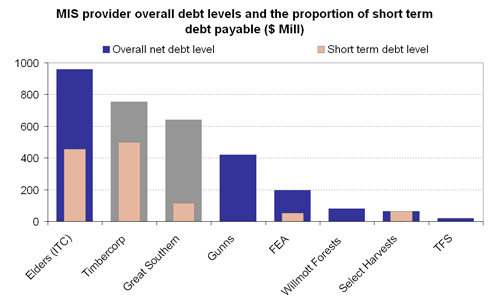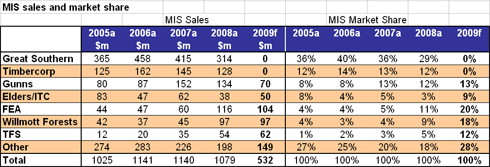
Managed Investment Schemes (MIS) have traditionally offered two core benefits, diversification away from share market linked investments and a substantial tax deduction.
The recent demise of Great Southern and Timbercorp is concerning to prospective MIS investors but it is important to distinguish their poorly conceived business model of inferior product and high company debt levels contributed to their downfall, rather than a reflection of the MIS industry per se.
On a positive note, this has at last forced planners and investors alike to look beyond the short term tax deductions and consider the viability of the manager as well as the underlying investment.
The devil is in the debt
As a result of the credit crunch, the pressing issue for all companies was how to refinance their debt in a ´suddenly´ risk averse market. Similar to Timbercorp, Great Southern’s downfall was its large amount of company debt. Their lack of vertical integration and secondary income streams meant that when their short term debt of $105 Mill became repayable, refinancing seemed impossible and their lenders more demanding.
ITC looks like it may be in danger of falling into the same trap with its parent company, Elders, holding large amounts of short term debt due to be refinanced in the next few months. We feel investors would do well to consider an alternative provider while they complete their refinancing.

Source: Collated from Bell Potter Securities Ltd, LonSec research, company accounts to 31st Dec 08 & 31st March 09 and includes recent announcements with regards to debt refinancing/capital raising.
Vertical Integration
By comparison, our review of the more vertically integrated providers such as Gunns, FEA and Willmott Forests, which have established forestry backgrounds prior to offering MIS products, shows that they offer relatively lower risk to investors. Their lower debt levels, diversified income streams and full end to end processing of harvested MIS products, has meant that they are much less reliant on MIS inflows and has allowed them to more readily refinance their debt. In light of this and their overall market shares, the opportunity of tax effective investing into a viable long term forestry product still exists for investors in 2009. With FEA’s track record of producing invesor returns, we have once again featured FEA Plantations as our forestry provider of choice. Investors looking for an alternative to forestry may wish to consider Arafura Pearls, which has an aticipated 142% tax deduction, further mitigating the risks associated with non-forestry.

Source: Bell Potter Securities Ltd (TFS) research report, collated from company reports, AAG and Adviser Edge.
FY09 MIS sales assumptions 0% growth Willmott Forests, 10% decline FEA, 25% decline other participants
Gunns is seeking to raise $70 Mill across 2 projects, ITC is seeking to raise $50 Mill across 3 projects
Comment: